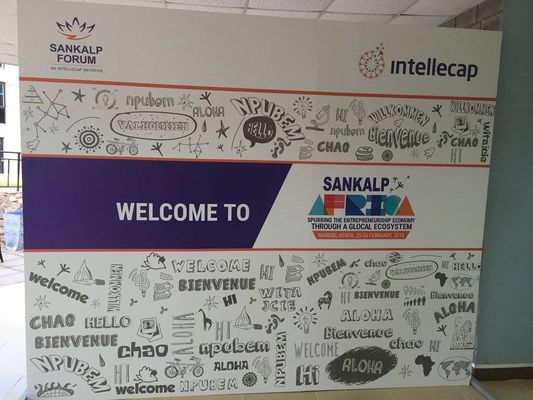Intellecap's Sankalp Africa Summit wrapped up at the end of February. Over 800 delegates from more than 35 countries from across Africa, Asia, Europe and North America came to the event in Nairobi where the theme of this year’s event was “Spurring the Entrepreneurship Economy.”
It was clear while attending Sankalp that the energy and agricultural sectors continue to pose strong opportunities for growth and partnerships because of an easy value-proposition and greater opportunity for return on investment – while unlocking the growth potential in the healthcare sector in Africa is much harder. Here are a few themes that came through over the course of the Summit:
Maturing the Healthcare Ecosystem: In many of the sessions we attended we heard about increasing interest in the healthcare sector by investors, donors, and support organizations but that many organizations in the healthcare sector are not as mature as investors and funders had hoped. Many attendees talked about the maturation of the healthcare innovation ecosystem but debated how to define and continue to grow that ecosystem. As one attendee said – "the very fact that there is disagreement about how to advance the space means we have come a long way in growing it”.
Matching Support to Stage of Growth: Speakers and attendees also talked about the need to provide innovators with the right support for the right stage of growth. Health entrepreneurs need better handoffs among the support organizations that help them and support organizations need more appropriate support models and metrics to help them direct resources to organizations that are likely to scale. Healthcare innovators pass through different stages as they grow, each with different needs. Support organizations in the healthcare innovation ecosystem in the region need to become more sophisticated in discerning and addressing the needs of organizations at different stages.
What is Scale? Participants also discussed the difficulty of defining scale and how to find ways to connect promising solutions across the value chain. Many investors and funders said it is challenging to move towards portfolio based investments that foster innovation across the value chain and that there is a need to provide funding for experimentation both within growth stage organizations and for different modalities of support in order for organizations to get to scale.
We were pleased to hear that many of these discussions validated much of the work that our SEAD team has been working on. Our new Smart Capital Modules created by the Duke Center for the Advancement of Social Entrepreneurship answer many of the questions raised at Sankalp about matching resources to stage of growth. And our East Africa team is about to release an East Africa Healthcare Innovation Landscape Report that identifies gaps and opportunities in the healthcare innovation ecosystem and recommends a path forward for improved collaboration and resource allocation.
One new health initiative we learned more about at Sankalp -- I Care 4 Africa – is a collaboration between Impact Hub in Ghana, The Merck Group, and other partners and was propelled in part by the SEAD Health Hackathon we organized in September. This initiative will offer early stage healthcare innovation support for companies in West Africa.
The innovation pipeline for healthcare entrepreneurs and organizations is solidifying and maturing across regions in Africa. We are seeing more specialized support programs for the healthcare sector and an increasing amount of collaboration among key partners in this space. In addition to SEAD, organizations such as Villgro Kenya and interest from cross-sector organizations like Unreasonable East Africa, Village Capital, and others are helping to bring about more partnerships and connections in the region for healthcare innovators.
We are proud to be contributing to this important work and look forward to seeing how the healthcare innovation ecosystem in East Africa matures over the next year.

